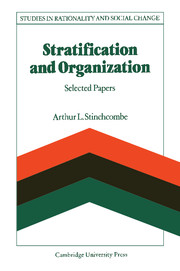Book contents
- Frontmatter
- Contents
- Acknowledgments
- 1 Rationality and social structure: an introduction
- PART I STRATIFICATION
- PART II ORGANIZATIONS
- PART III SOCIOLOGY AS A PROFESSION
- 13 On getting ‘hung-up’ and other assorted illnesses
- 14 Review of Max Weber's Economy and Society
- 15 Merton's theory of social structure
- 16 A structural analysis of sociology
- 17 On journal editing as a probabilistic process (Co-authored with Richard Ofshe)
- 18 The mathematical biology of survey research centres
- 19 Should sociologists forget their mothers and fathers?
- Bibliography
- Name and place-name index
- Subject index
16 - A structural analysis of sociology
from PART III - SOCIOLOGY AS A PROFESSION
Published online by Cambridge University Press: 06 July 2010
- Frontmatter
- Contents
- Acknowledgments
- 1 Rationality and social structure: an introduction
- PART I STRATIFICATION
- PART II ORGANIZATIONS
- PART III SOCIOLOGY AS A PROFESSION
- 13 On getting ‘hung-up’ and other assorted illnesses
- 14 Review of Max Weber's Economy and Society
- 15 Merton's theory of social structure
- 16 A structural analysis of sociology
- 17 On journal editing as a probabilistic process (Co-authored with Richard Ofshe)
- 18 The mathematical biology of survey research centres
- 19 Should sociologists forget their mothers and fathers?
- Bibliography
- Name and place-name index
- Subject index
Summary
The fundamental observation of structural analysis in Lévi-Strauss is that institutionalized systems of exchange (of women, material goods, symbols) rest on a double system of distinctions. On the one hand, those who can or must exchange according to the norms of the system must be distinguished from those who cannot – for instance, a kinship system must define the boundaries of endogamy within which the system is institutionalized (e.g. the tribe). On the other hand, the units which can or must exchange must be distinguished from each other, at least so that one can be defined as lacking something that the other can furnish – for example, in kinship systems the exogamous unit that needs a wife must be distinguished from the unit eligible to supply a wife. It is this peculiar irony of the central forms of solidarity being defined by a system of differentiation that has captured Lévi-Strauss' imagination.
The second part of Lévi-Strauss' argument is that in order to talk about society and solidarity, the mythical system must have symbolic distinctions in it corresponding to the distinctions between subgroups that need each other in the system of exchange. Moieties or sections or lineages that are exogamous need to be contrasted symbolically with the moieties or sections or lineages with which they exchange. But these contrasts must be ‘mediated’ by other contrasts that distinguish the exchanging partners from the rest of the world.
- Type
- Chapter
- Information
- Stratification and OrganizationSelected Papers, pp. 318 - 332Publisher: Cambridge University PressPrint publication year: 1986



